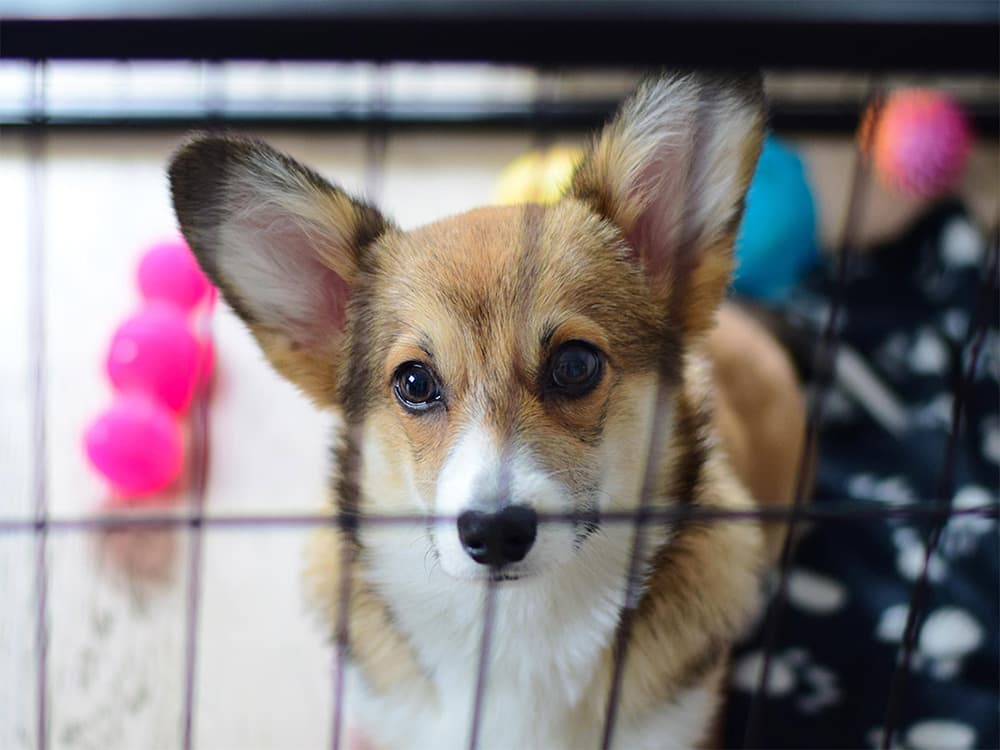Puppy Sleep Schedule: How to Sleep Train Your Puppy
These bundles of energy can be a bit much without proper naptimes. Here’s how to put your little pup on a schedule that will keep everyone happy.
These bundles of energy can be a bit much without proper naptimes. Here’s how to put your little pup on a schedule that will keep everyone happy.
by Mollie Jackman, | August 15, 2024

ROMAOSLO / iStock
Any new pet parent will agree puppies are truly adorable…until they exhaust you. You’ll quickly figure out, as you raise a puppy, that establishing a consistent sleep schedule is crucial for their health, not to mention your peace of mind. A well-structured routine, including bedtime rituals and a cozy sleeping area, helps your puppy adjust smoothly to your household’s rhythm. It also ensures they get the rest they need to grow and thrive. In this guide, we’ll cover all the steps of new puppy training — from setting up a comfortable sleep space to adjusting puppy sleep schedules by age — so you can focus more on the joys of having a playful, happy puppy in your home.
While veterinary experts estimate that most puppies need 18 to 20 hours of sleep, there are several milestones in the first few months that can affect their napping habits. Understanding these stages and how they affect your puppy’s sleep, can help them adapt and keep you sane so you can enjoy their playful energy when they are awake. Let’s go over how to adjust a puppy’s sleep schedule based on their age.
At eight to 12 weeks, puppies are growing and developing rapidly. This is when they learn socialization skills and can form extremely strong bonds with their pet parents. It’s also a pivotal time to get a puppy to sleep on schedule. Your puppy will likely sleep most of the day and night during this time, but they may need to go out frequently for potty breaks. Crate training, positive reinforcement, and a designated outdoor potty area can help you manage this first stage of your new puppy's sleep schedule.
At three to four months, puppies continue to grow and develop physical and cognitive abilities. This growth stage often results in slightly reduced sleep needs, with puppies sleeping around 16 to 18 hours daily. As they become more active and engaged with their environment, their nap patterns might shift, with fewer but longer naps. To support this transition, maintain a consistent sleep and activity schedule, ensure plenty of physical and mental stimulation during wake times, and create a calm, comfortable environment to encourage restful slumber.
At four to six months, puppies start developing more predictable sleep patterns, typically needing around 14 to 16 hours of sleep daily. This stage is marked by increased activity and curiosity, which may reduce their number of daytime naps but lengthen nighttime sleep. To support this transition, maintain a consistent routine with regular meal times, play sessions, and potty breaks. Ensure the sleeping environment is comfortable and quiet, which can help the puppy settle down more easily and encourage longer, uninterrupted sleep periods.
Between six months and one year, puppies typically need around 12 to 14 hours of sleep daily as they become more active and physically developed. At this stage, their sleep is often consolidated into longer nighttime sessions with fewer daytime naps. (Note that most dogs shouldn’t be left alone for more than six to eight hours, even if they can sleep through the night.) To support this evolving schedule, provide regular exercise and mental stimulation during the day, which helps them expend energy and rest better at night. Maintaining a consistent bedtime routine and creating a quiet, comfortable sleeping area is crucial to ensuring quality sleep and helping them adapt to the household rhythm.
Adjusting your puppy’s sleep schedule can be a game changer as you help them grow into their new environment. With a little patience and consistency, you can gradually shift their sleep patterns to match your household’s rhythm. Establishing a routine that balances naps and playtime will not only support your puppy’s development but also keep sleep-related chaos under control.
Creating a consistent bedtime routine helps signal to your puppy that it’s time to wind down for the night. Start with calm activities like a short walk or gentle play, followed by quiet time in a comfortable, designated sleeping area. This routine not only promotes better sleep but also helps your puppy feel secure and relaxed as they settle into their new home.
Balancing naps with active play is essential for your puppy’s well-being. Schedule regular play sessions to tire them out physically and mentally, making sure they have plenty of opportunities for naps throughout the day. This balance helps regulate their energy levels and prevent them from getting hyper at night.
To adjust your puppy’s sleep schedule, gradually shift bedtime and wake-up times by 15 to 30 minutes each day until you reach the desired schedule. Keep daily activities consistent to help your puppy adapt more easily. Patience and persistence are key, as it may take a few weeks for your puppy to fully adjust to the new routine.

Justyna Olichwier / Alamy Stock Photo
Crate training often gets a bad reputation, but with the right approach, it can become a positive, comforting experience for your puppy — especially when establishing a sleep schedule. A properly introduced crate serves as a secure, happy place for your dog to rest, helping them settle into a consistent sleep routine. This safe space gives your puppy a designated area to relax, which is extremely helpful in sleep training.
Crate training a puppy at night has several benefits for establishing a puppy’s sleep routine. It provides a secure space that mimics a den, helping puppies feel safe and relaxed. Additionally, using a crate can prevent destructive behaviors during the night. Crate training can also help with potty training, since puppies learn they need to hold it until they are let out.
To successfully crate train a puppy at night, start by making the crate an inviting space. Introduce your puppy to the crate gradually, using treats and toys to create positive associations. At night, place the crate in a quiet area of the house where the puppy can sleep undisturbed. (You can also start with the crate near you if your dog experiences separation anxiety.) Establish a routine that includes a potty break before bed and make sure your puppy has comfortable bedding. Consistency and patience are key, as it may take a few nights for the puppy to adjust.
Common challenges while crate training include whining, barking, and resistance to entering the crate. To address these issues, ensure the crate is comfortable, and never use it as a form of punishment, as this can create negative associations. If your puppy whines or barks, resist the urge to let them out immediately. Instead, wait for a moment of quiet before opening the crate. Gradually increase the time your puppy spends in the crate while you are home, and always reward calm behavior.
Creating a sleep-friendly environment is crucial for ensuring your puppy gets the restful sleep they need to grow and thrive. By setting up a comfortable, quiet, and secure sleeping area, you can help your puppy feel safe and relaxed, which promotes better sleep quality and overall well-being. While you’re setting up their sleeping space, you can also work on puppy-proofing the rest of your house.
Selecting the right bedding for your puppy’s sleeping area is an essential item on any new puppy checklist. Look for soft, supportive materials that provide cushioning and warmth, such as plush blankets or padded mats. Ensure the bedding is appropriately sized for your puppy and easy to clean, as accidents can happen. Choosing hypoallergenic materials can also help if your puppy has sensitive skin or allergies.
As with humans, temperature and lighting can help set the stage for a good night of sleep. Ensure the space is neither too hot nor too cold, and consider using a small fan or heater if needed. Use dim lighting to signal bedtime and promote relaxation. Avoid placing your puppy’s bed in direct sunlight or drafts, which can be disruptive.
A quiet environment can help your puppy sleep soundly. Place the bed in a low-traffic area of your home to minimize disturbances. Consider using white noise machines or calming music to mask household or neighborhood noises. Try to make sure other pets and family members are mindful of quiet times to help your puppy get the rest they need.
Crating your dog at night can provide a safe, comfortable space and aid in house training. It helps prevent accidents and teaches your puppy to hold their bladder until morning.
To address nighttime whining, ensure your puppy has had plenty of exercise, food, and potty breaks. Gradually extend the time they spend in the crate, and avoid responding to whining. Instead, offer praise occasionally while your puppy is being quiet in their crate.
Puppies sleep a lot — often 18 to 20 hours a day — because sleep is crucial for their growth and brain development. Rest helps them process new experiences, recover from playtime, and save up energy for growing.
Setting a consistent bedtime helps regulate your puppy’s sleep schedule. Putting your puppy to bed around the same time you go to bed can help establish a routine, ensuring both of you get enough rest each night.

Mollie Jackman is a writer, editor, and graduate of Lindenwood University’s MFA in writing. She’s also a pet parent to a goofy big-eared dog and two brown tabby cats, plus a rotating cast of foster animals. When she’s not reading, writing, or picking up strays, she can be found binge-watching arguably terrible reality TV shows and cooking competitions or rolling around the local skating rink in Columbia, Missouri. Mollie’s writing on this site is not in any way affiliated with the University of Missouri, or her work as a copywriter for MU Health Care.

Adoption Advice

Adoption Advice

Adoption Advice

Adoption Advice
Considering dog adoption? Learn the differences between adult dog and puppy adoption to find your perfect match.

Adoption Advice
Getting a dog can be the best thing you ever do — if you’re prepared.

Adoption Advice
These studies prove that dogs’ awesomeness is more than just a vibe.

Adoption Advice
Curious about dog-proofing? Learn how to make your home safe and enjoyable for your pup.

Adoption Advice
Thinking of adopting a dog? Learn more about the average monthly costs of dog parenthood.

Adoption Advice
Preparing for a new puppy with kids? Read our guide for insights on creating a harmonious bond between your children and new puppy.